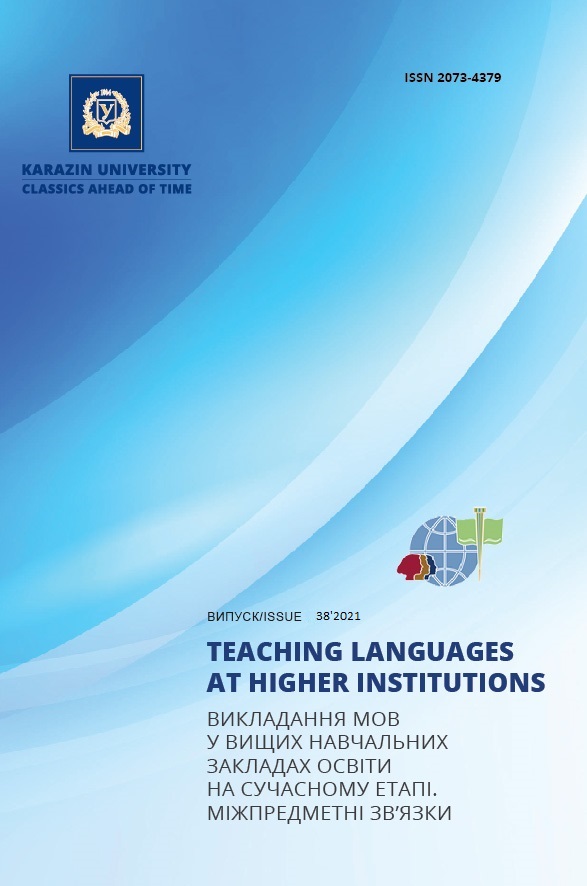Ascertaining experiment in the system of methods of linguodidactic and methodological research
Abstract
The problem of organizing, implementing, and describing the results of linguodidactic and methodological qualification research by foreign students-philologists is an urgent issue that requires coverage of its theoretical and practical aspects, as evidenced by the analysis of theses of foreign students-philologists and their recognition of difficulties that arise in the process of performing qualification research, including those met during the application of the method of ascertaining experiment and its description. The purpose of the article is to describe the essence of the ascertaining experiment and the features of the speech genre in which it is reproduced in the text of linguodidactic and methodological research.
In the course of the study, the following methods were used: analysis of theoretical sources, synthesis, and generalization of the obtained information; observation of the educational process and analysis of qualification studies of graduates-philologists; questionnaires of students and conversations with teachers to identify difficulties that arise during the application of the ascertaining experiment.
The main results of the study are as follows: description of the goals, objectives, and content essence of the ascertaining experiment in linguodidactic and methodological research; clarification of the terminology used; description of the speech genre of the ascertaining experiment; selection of language markers for teaching foreign philologists to describe the ascertaining experiment.
It is proved that the ascertaining experiment is carried out to obtain more detailed information for orientation in the initial level of the studied linguodidactic or methodological problem and provides the basis for theoretical modeling of a more effective educational process. New knowledge about the subject of research was acquired in the course of the ascertaining experiment, which gives reason to call the method an experiment.
The description of the ascertaining experiment is a secondary speech genre, standardized in composition and language tools. Since each component of the text of this genre is designed using standardized language tools, it is advisable to train foreign graduates-philologists to use these tools.
The prospects of the research consist in the theoretical substantiation and development of a system of exercises for the effective formation of skills to carry out and describe an ascertaining experiment by foreign philologists.
Downloads
References
Azimov, Je.G. and Shhukin, A.N. (2009). Novyj slovar metodicheskih terminov i ponjatij (teorija i praktika obuchenija jazykam) [New dictionary of methodological terms and concepts (theory and practice of teaching languages)]. Moscow: IKAR [in Russian].
Barnet, V. (1985). Problemy izuchenija zhanrov ustnoj nauchnoj rechi [Problems of studying genres of oral scientific speech]. Sovremennaja russkaja ustnaja nauchnaja rech [Modern Russian oral scientific speech]. Krasnoyarsk: Izd-vo Krasnoyarskogo un-ta, pp. 80–132 [in Russian].
Bahtin, M.M. (2000). Avtor i geroj. K filosofskim osnovam gumanitarnyh nauk [Author and hero. To the philosophical foundations of the humanities]. Saint Petersburg: Azbuka [in Russian].
Kuznecov, S.A. (Comp.). (1998). Bolshoj tolkovyj slovar russkogo jazyka: A-Ja [Great Dictionary of Russian language]. Saint Petersburg: Norint. Available at: https://gufo.me/dict/kuznetsov/%D1%8D%D0%BA%D1% 81%D0%BF%D0%B5%D1%80%D0%B8%D0%BC%D0%B5%D0%BD%D1%82 [Accessed 2 March 2021] [in Russian].
Butenko, I.A. (1989). Anketnyj opros kak obshhenie sociologa s respondentami [A questionnaire survey as a communication between a sociologist and respondents]. Moscow: Vysshaja shkola [in Russian].
Volkova, S.V. (2018). Fenomenologija obrazovatelnyh tehnolgij [Phenomenology of educational technologies]. Vestnik Novosibirskogo gosudarstvennogo pedagogicheskogo universiteta [Novosibirsk State Pedagogical University Bulletin], 1, pp. 93–103 [in Russian].
Galskova, N.D. (2000). Sovremennaja metodika obuchenija inostrannym jazykam [Modern methods of teaching foreign languages]. Moscow: ARKTI [in Russian].
Galskova, N.D. (2008). Eshhe raz o lingvodidaktike [Once again about linguodidactics]. Inostrannye jazyki v shkole [Foreign languages at school], 8, pp. 4–10 [in Russian].
Druzhinin, V.N. (1997). Jeksperimentalnaja psihologija [Experimental psychology]. Moscow: IINFRA-M [in Russian].
Dzhusupov, M. (2009). Lingvodidaktika v polinauchnoj sisteme jazykovogo obrazovanija [Linguodidactics in the polyscientific system of language education]. Russkij jazyk za rubezhom [Russian language abroad], 2, pp. 50–55 [in Russian].
Kamenev, R.V., Krasheninnikov, V.V., Farnika, M. and Abramova, M.A. (2018). Vysokie tehnologii i transformacija sistemy obrazovanija: konstruktivnost i destruktivnost [High technologies and transformation of the educational system: constructiveness and destructiveness]. Vestnik Novosibirskogo gosudarstvennogo pedagogicheskogo universiteta [Bulletin of Novosibirsk State Pedagogical University], 6, pp. 104–117 [in Russian].
Ljahovickij, M.V. and Koshman, I.M. (1981). Tehnicheskie sredstva v obuchenii inostrannym jazykam [Technical means in teaching foreign languages]. Moscow: Prosveshhenie [in Russian].
Minjar-Beloruchev, R.K. (1996). Metodicheskij slovnik: Tolkovyj slovar terminov metodiki obuchenija jazykam [Methodical vocabulary: Explanatory dictionary of terms for teaching languages]. Moscow: “Stella” [in Russian].
Moskovkin, L.V. (2002). Metodologicheskie aspekty lingvodidaktiki i metodiki obuchenija jazyku [Methodological aspects of linguodidactics and methods of teaching language]. Saint Petersburg: Korifej [in Russian].
Meshherjakov, V.N. et al. (2004). Osnovy shkolnogo rechevedenija [Fundamentals of school speech: a guide for teachers]. Tolyatti-Moscow: Izd-vo TGU. [in Russian].
Stativka, A.M. (2019). Anketuvannya yak metod znaxodzhennya novogo znannya u procesi dyplomnogo doslidzhennya filologiv [Questionnaire as a method of finding new knowledge in the process of diploma research of philologists]. Vykladannia mov u vyshchykh navchalnykh zakladakh osvity na suchasnomu etapi. Mizhpredmetni zviazky [Teaching Languages at Higher Institutions]. Kharkiv: V.N. Karazin Kharkiv National University, 35, pp. 93–104 [in Ukrainian]. DOI: 10.26565/2073-4379-2019-35-08.
Shanskij, N.M. (1985). Russkoe jazykoznanie i lingvodidaktika [Russian linguistics and linguodidactics]. Moscow: Russkij jazyk [in Russian].
Shatilov, S.F. (1986). Metodika obuchenija nemeckomu jazyku v srednej shkole [Methods of teaching the German language in secondary school]. Moscow: Prosveshhenie [in Russian].
Shtulman, Je.A. (1976). Metodicheskij jeksperiment v sisteme metodov issledovanija [Methodical experiment in the system of research methods]. Voronezh: Izd-vo Voronezhskogo un-ta [in Russian].
Shhukin, A.N. (2008). Lingvodidakticheskij jenciklopedicheskij slovar [Lingvodidacticheskiy encyclopedic dictionary]. Moscow: Astrel, Ast-Hranitel [in Russian].
Mitrofanova, O.D. and Sosenko, Je.S. (Eds.). (1975). Eksperimentalnye issledovanija v metodike prepodavanija russkogo jazyka kak inostrannogo [Experimental research in the methodology of teaching Russian as a foreign language]. Moscow: Izd-vo Mosk. un-ta [in Russian].
Adams, C. (2006). Power Point habits of mind and classroom culture. Jounal of Curriculum Studies, l. 38 (4), pp. 389–411 [in English].
Abdelrahman, L.A.M. and Hai-Leng, C. (2013). What does PowerPoint mean to you? A Phenomenological Study. Procedia-Social and Behavioral Sciences, 103, pp. 1319–1326 [in English].

